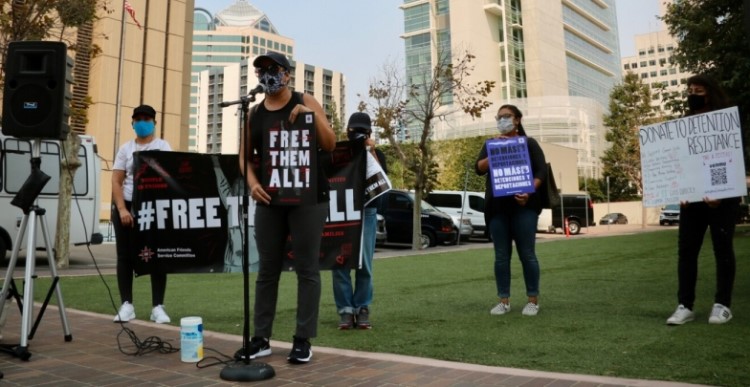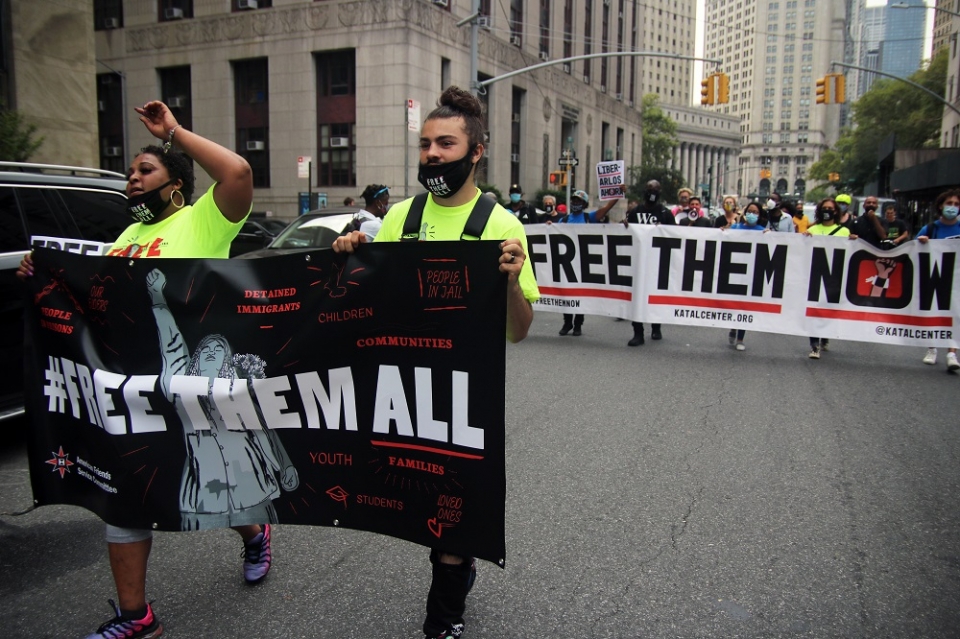
AFSC
Prisons, jails, and detention centers have never been safe places. Human and civil rights violations are rampant, health care is inadequate, and the trauma of confinement takes a toll on the physical and mental health of those who are incarcerated.
With COVID-19, the risks multiply exponentially, making every sentence a potential death sentence. The nature of confinement makes it almost impossible for people to practice social distancing, and lack of access to medical care and basic sanitation supplies have fueled the virus’s spread. As of early October, more than 143,243 incarcerated people have tested positive—and at least 1,211 have died, according to The Marshall Project.
Since the start of the pandemic, AFSC offices have been flooded with letters and calls from incarcerated people across the country. We hear over and over, “I don’t want to die in here.”
In Michigan, families and loved ones are pleading with their governor for compassionate release as the virus spreads across the state’s overcrowded prisons.
In New York, a young filmmaker, Kharon Benson, who works with AFSC, waited for weeks to hear from his dad who was incarcerated, saying, “I just want to know that he’s alright.” We hear similar fears from many other young people with incarcerated loved ones.
This spring, AFSC filed a class action lawsuit with partners demanding the release of all immigrant detainees at the Elizabeth Detention Center (EDC), a for-profit immigration jail in New Jersey where, by early May, more than 18 immigrants had tested positive for COVID-19 and at least one worker has died. Our legal staff also supported several individuals in successfully petitioning for release.
“EDC, like other jails, is a tinderbox for people who are detained there, people who work there, and their families and communities,” said Chia-Chia Wang, organizing and advocacy director for AFSC in New Jersey. "We want to see everyone released so they can reunite with their loved ones and safely practice social distancing at home.”
AFSC was also among the first organizations to unite with people across the U.S. under the call to #FreeThemAll, demanding the release of people from incarceration in this pandemic. From Sept. 9 to 13, we sponsored the National Days of Action to #FreeThemAll, timed to coincide with the 49th anniversary of the Attica uprising, when more than 2,000 people incarcerated in upstate New York took over the yard of Attica Correctional Facility to protest inhumane conditions and demand freedom, wages, education access, medical care, and more.
During our days of action, hundreds of people took part in in-person and online events across the country, including virtual gatherings to learn more about the powerful call to end all forms of incarceration—while many others marched, drove, flew kites, and covered their neighborhood in posters in vibrant, creative local actions to pressure on decision-makers to free our community members from cages.

So far, more than 13,000 supporters have sent messages to their governors, Immigration and Customs Enforcement (ICE), and the federal Bureau of Prisons, urging them to release people and take other immediate steps to protect those behind bars from the pandemic. But the call to #FreeThemAll is also part of a larger call for racial justice—and a growing movement that is challenging the policies and practices that have led to mass incarceration in this country.
Giving every person the chance to come home
It can be hard to imagine a world without prisons and jails. We live in a society where we’re repeatedly told that incarceration and law enforcement protect us. But if incarceration stopped violence, the U.S. would be the most peaceful country in the world. Instead, the country warehouses 2.3 million people—the vast majority of whom are Black, Brown, and poor people—while doing little to stop harm or help survivors of violence heal.
Over 600,000 of those 2.3 million people are in jails, and the vast majority in jail are pretrial, meaning they have not yet been convicted of a crime. Many are there simply because they don’t have enough money to pay bail. More than 30,000 people are held in immigration detention because of cruel and illogical policies that condemn them to incarceration while they wait for their immigration cases to be adjudicated. And the majority—almost 1.3 million people—are held in state prisons, often serving long sentences of decades or more.
No one is served by keeping millions of people in cages—except for-profit prison corporations and other entities that profit from mass incarceration. If poverty, racism, trauma, and lack of access to essential services are some of the primary factors leading to incarceration, it follows that locking people up in places where they will be further traumatized and impoverished simply perpetuates the cycle. We can do better.
That’s why AFSC is calling for resources to be directed away from incarceration and invested in transformative forms of justice as well as education, health care, and other institutions that center community well-being.
We want to give all 2.3 million people the opportunity to come home.
What can we do instead?
AFSC has a long history of supporting prison abolition. In 1978, the Board of Directors approved a minute that read, in part, “The American Friends Service Committee rejects imprisonment as punishment for those whose behavior may be considered criminal. … This stand is based on our belief in the dignity of all human beings.”
In the decades since, we have worked tirelessly alongside incarcerated and formerly incarcerated people, people in immigration detention, and families and communities to end inhumane practices and help people navigate the harms of incarceration—from solitary confinement to physical and sexual abuse and other forms of trauma.
We’ve also worked to build restorative and transformative forms of justice and community-based practices that move away from a framework of crime and punishment and toward a system rooted in accountability and healing. Here are just a few examples of approaches that can make a big difference if implemented on a larger scale:
- Transformative and restorative justice in response to harm: Transformative and restorative justice processes hold those who cause harm accountable and help survivors of violence heal. Instead of using violent systems to address violence, they address the root causes of what happened with an eye to preventing future harm, centering the needs of those involved and their communities.
- Mediation and conflict resolution skills for all: Supporting young people in learning the skills to resolve conflict nonviolently is far more effective than having police in schools. When young people are supported, not criminalized, they become leaders in their schools and communities and develop skills that last a lifetime.
- People’s basic needs met: Ensuring that everyone has access to housing, health care, education, healthy food, employment, environmental protections, and free and accessible addiction and mental health services could go a long way toward addressing the root causes of harmful actions and creating an environment where all people have the resources needed to thrive.
- Immigration processes based on support, not punishment: Immigrants are valued members of our communities. They should be given access to the resources and community and legal support they need to adjust their immigration status, not separated from their families, jailed, abused, or deported.
- Strong emergency response systems that don’t involve the police: In a crisis, we need skilled response teams to respond quickly and help find solutions—for example, people trained in de-escalation and mediation skills, addiction and mental health counselors, and others who can help connect people to the resources they need.
The 2.3 million people now locked up facing the threat—and increasingly the reality—of COVID-19 have families, communities, and loved ones. As COVID-19 continues to reshape many aspects of our lives, it’s time for us to also imagine a “new normal” without the inhumane systems that have formed the basis of our criminal legal system for far too long. Prisons and detention centers aren’t just amplifiers of a public health crisis, they are a public health crisis. Together, we can create far better solutions to the problems our communities face than condemning people to live— and die—in cages. Together we can make the changes needed to free them all.